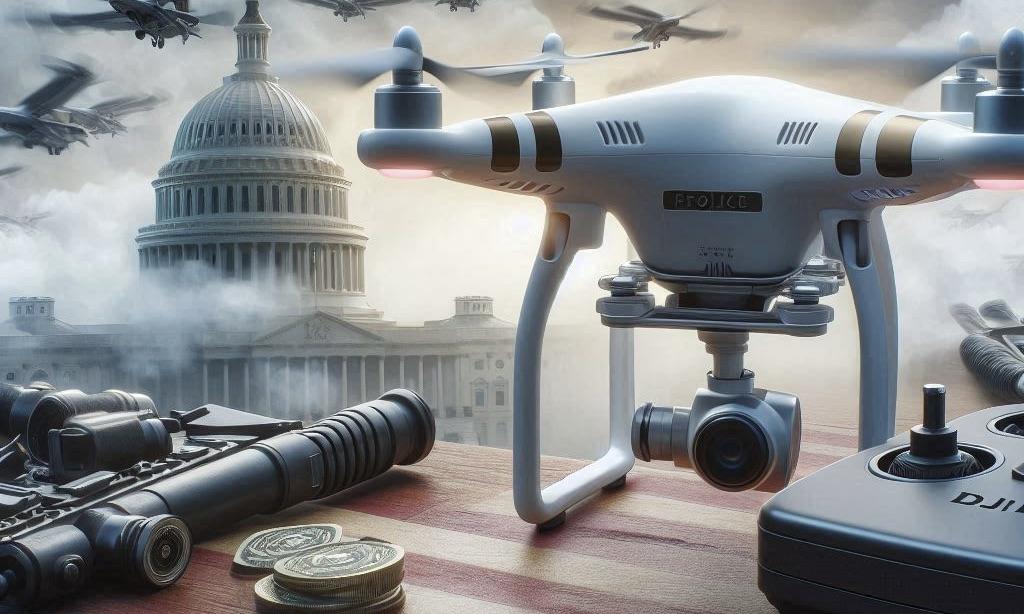Drones manufactured by China's DJI face renewed regulatory scrutiny in the US. A Senate amendment, citing national security concerns, aims to incorporate the DJI drone ban into the National Defense Authorization Act. This bipartisan move could reintroduce the ban after its initial exclusion.
Senate Amendment Reintroduces DJI Drone Ban in Defense Bill, Citing National Security Concerns
After initially appearing exempt from a moratorium, drones manufactured by the Chinese company DJI were again the subject of increased regulatory scrutiny in the United States. This scrutiny is directed at products and services that could compromise American national security. The Countering CCP Drones Act, which would have prohibited the sale of new drones by DJI in the United States, was conspicuously absent from the most recent iteration of the National Defense Authorization Act (NDAA) released by the Senate's Armed Services Committee.
Senator Rick Scott (R-FL) proposed an amendment to the NDAA shortly after it was uploaded to the Senate's website. The amendment suggested that the Drones Act be incorporated into the measure. This proposal, co-sponsored by Senator Mark Warner (D-VA), promises bipartisan support, a potential ray of hope for the Act's future.
According to Wccftech, the CCP Drones Act was initially introduced in 2022 and was brought to the forefront of the public eye earlier this year when the House passed a version of the NDAA that included the measure. Small private enterprises and firefighters opposed this passage for various reasons, and it was met with substantial opposition throughout the United States. The firefighters shared that they rely on DJI drones for their jobs, while the business owners claimed they would lose their business due to the lack of comparable low-priced drones in the market.
The Senate has succumbed to this pressure, as the most recent version of the NDAA, uploaded earlier today, did not include the Drone Act. Nevertheless, any celebrations that the impacted individuals may be planning would be short-lived, as the S.Amdt.3098, which aims to reintroduce the Drones Act to the NDAA, was swiftly supported by both Democratic and Republican senators
Senate to Debate DJI Drone Ban Amendment in NDAA Amid Legislative Challenges and Presidential Veto Threats
The Drones Act's absence from the NDAA shared by the Senate and its subsequent appearance in a proposed amendment may be more than a coincidence. If it had been included in the measure, lawmakers could have wholly disregarded the issue during the NDAA's subsequent passage through the Senate. The measure will now proceed to the Senate floor for a debate, as the Senate Armed Services Committee has completed its review and released it.
The amendment is likely to spark a lively debate. During this debate, the two Senators who proposed it will defend it, and any others who may be opposed will present counterarguments. This debate and the eventual outcome of the vote will be a crucial part of the legislative process, engaging all parties involved.
The President's signature is the final step in a bill's passage process. However, the upper and lower houses of Congress must adopt comparable versions of the bill before it reaches President Biden's desk. Lastly, the President may wait to sign the law, even if it successfully navigates this challenging process. He has explicitly declared that he will veto the NDAA (H.R. 8774) if it reaches his desk. This potential hurdle underscores the challenges that the Act still faces.



 Trump Warns Iran as Gulf Conflict Disrupts Oil Markets and Global Trade
Trump Warns Iran as Gulf Conflict Disrupts Oil Markets and Global Trade  Samsung Electronics Stock Poised for $1 Trillion Valuation Amid AI and Memory Boom
Samsung Electronics Stock Poised for $1 Trillion Valuation Amid AI and Memory Boom  Anthropic Refuses Pentagon Request to Remove AI Safeguards Amid Defense Contract Dispute
Anthropic Refuses Pentagon Request to Remove AI Safeguards Amid Defense Contract Dispute  Middle East Airspace Shutdown Disrupts Global Flights After U.S.-Israel Strikes on Iran
Middle East Airspace Shutdown Disrupts Global Flights After U.S.-Israel Strikes on Iran  Panama Investigates CK Hutchison’s Port Unit After Court Voids Canal Contracts
Panama Investigates CK Hutchison’s Port Unit After Court Voids Canal Contracts  Netflix Stock Jumps 14% After Exiting Warner Bros Deal as Paramount Seals $110 Billion Acquisition
Netflix Stock Jumps 14% After Exiting Warner Bros Deal as Paramount Seals $110 Billion Acquisition  Lynas Rare Earths Shares Surge on Strong Half-Year Earnings and Rising Global Demand
Lynas Rare Earths Shares Surge on Strong Half-Year Earnings and Rising Global Demand  Toyota Plans $19 Billion Share Sale in Major Corporate Governance Reform Move
Toyota Plans $19 Billion Share Sale in Major Corporate Governance Reform Move  Paramount Skydance to Acquire Warner Bros Discovery in $110 Billion Media Mega-Deal
Paramount Skydance to Acquire Warner Bros Discovery in $110 Billion Media Mega-Deal  Coupang Reports Q4 Loss After Data Breach, Revenue Misses Estimates
Coupang Reports Q4 Loss After Data Breach, Revenue Misses Estimates  APEX Tech Acquisition Inc. Raises $111.97 Million in NYSE IPO Under Ticker TRADU
APEX Tech Acquisition Inc. Raises $111.97 Million in NYSE IPO Under Ticker TRADU  Amazon’s $50B OpenAI Investment Tied to AGI Milestone and IPO Plans
Amazon’s $50B OpenAI Investment Tied to AGI Milestone and IPO Plans  Flare, Xaman Roll Out One-Click DeFi Vault for XRP Yield via XRPL Wallets
Flare, Xaman Roll Out One-Click DeFi Vault for XRP Yield via XRPL Wallets  OpenAI Pentagon AI Contract Adds Safeguards Amid Anthropic Dispute
OpenAI Pentagon AI Contract Adds Safeguards Amid Anthropic Dispute  BlueScope Steel Shares Drop After Rejecting Revised A$15 Billion Takeover Bid
BlueScope Steel Shares Drop After Rejecting Revised A$15 Billion Takeover Bid  Snowflake Forecasts Strong Fiscal 2027 Revenue Growth as Enterprise AI Demand Surges
Snowflake Forecasts Strong Fiscal 2027 Revenue Growth as Enterprise AI Demand Surges 































